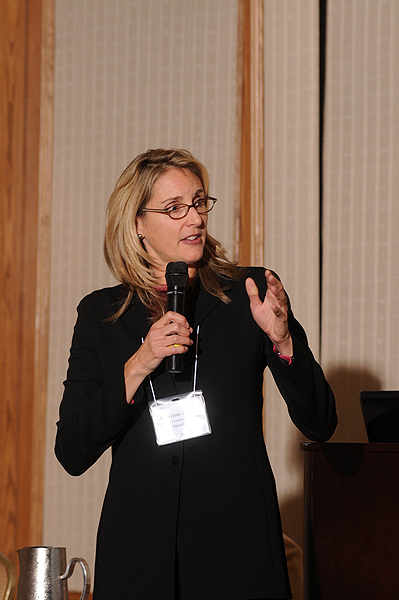
Christine Jahnke admits that she was an awkward teenager.
By junior high school, she towered over all the boys her age. She was 5-foot-10-inches tall, and while that was great for basketball, it took a toll on her self-confidence—not to mention her wardrobe.
“I always felt like I was wearing high-water pants, which I was,” she laughed during a recent telephone interview from her home in Washington, D.C. “My sleeves were never long enough. So I was not having as much confidence as we’d all like to have.”
It has taken her a long time to build up her self-esteem. But now, two inches taller (she’s 6 feet tall) and decades later, she is the author of “The Well-Spoken Woman,” a comprehensive guide that focuses on moving females into leadership positions by teaching them how to command an audience.
The self-help book, which was released last year, studies famously successful women—including Ann Richards, Suze Orman and Hillary Clinton—and dissects what makes them powerful. By sharing their stories, as well as her own, Ms. Jahnke said she hopes to inspire women to speak their minds with confidence, whether to stand up in a PTA meeting or run for elected office.
“Most people don’t know that 16 percent of the U.S. Congress is women. In New York, you have tremendous role models—Kirsten Gillibrand and Hillary Clinton—but by far and large, it’s mostly men making the decisions,” she said. “As women, we bring a different perspective and it’s important for the perspective to be heard.”
Ms. Jahnke, who summers in Hampton Bays, first entered the public eye in 1985 as a weekend “weather girl” for the NBC affiliate in Rochester, Minnesota—about 60 miles from her hometown, Albert Lea. It was there she gained empathy for anxious speakers.
“It was the 10 o’clock evening news. I was scared out of my mind,” she laughed. “I’m so glad the camera was at waist level because everyone would have seen my knees shaking. And the weather forecast was three minutes, which was a lifetime. I felt like I was going to pass out before it was over.”
Everyone gets nervous, Ms. Jahnke said, and women in particular. Not only are they concerned with what to say, they’re also worried about their physical appearance and wardrobe, she said.
There are ways to beat back stage fright, Ms. Jahnke assured. First, stop second-guessing.
“Don’t doubt your own abilities. When women feel passionate about a subject matter or an issue, they can and they should speak out on it,” she said. “That’s the most important thing. The number of women CEOs is 3 percent. If we’re going to improve those numbers, we need to speak out. Speak out because you can do it.”
Develop a signature style, Ms. Jahnke said. All great speakers have one. Giving a presentation is a performance, she continued, but it shouldn’t come across as insincere or play-acting.
“The best speakers know how to be on stage and be their best selves,” she said.
Second, consider the message. Be specific about the topic and get to the point quickly.
“Understand that you need to build a connection with them,” she said. “Many people start by asking, ‘What do I need to say?’ The better question is, ‘What do my audience members need to hear?’ The essential question that every audience member asks themselves is, ‘What’s in it for me?’ The ‘So what, who cares?’ So you need to answer it for them. You need to tell them why they should care, and fast.”
It’s key to deliver with confidence, Ms. Jahnke emphasized. Deep breathing—in through the nose, holding it for a count or two and then audibly exhaling through the mouth—helps the voice stay relaxed. Shoulder and neck rolls can keep physical anxiety at bay, she said, and take the outfit for a test drive well in advance.
And as the adage goes, practice makes perfect, Ms. Jahnke said.
“I was helping Michelle Obama prepare for her first international speech and the event was when the U.S. was competing to host the 2016 Olympic games,” Ms. Jahnke recalled. “She was part of the U.S. delegation that presented in Copenhagen, Denmark. The First Lady arrived in Copenhagen on Wednesday and the speech was Friday morning at 9 o’clock. How many times do you think we went over her speech?”
Four times.
“People ask, ‘Why would Michelle Obama practice? She’s such a good speaker.’ That’s the point,” Ms. Jahnke continued. “She’s a good speaker because she does rehearse. People think it happens by magic, that it’s fairy dust. But it’s that people, who are really good, work at it.”
For more information, visit wellspokenwoman.com.